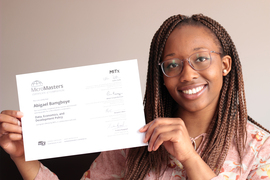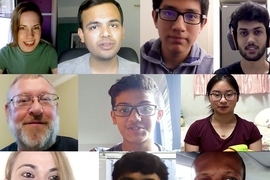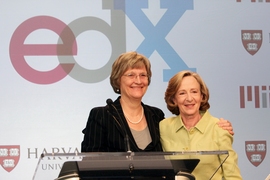This set of FAQs offers information about today’s announcement of a transaction to sell edX as a public benefit company while funding a nonprofit dedicated to strengthening the impact of digital learning.
General questions
- What is MIT announcing today?
With the support of the senior leadership of MIT and Harvard University, the edX board has agreed to sell the assets of edX to 2U, Inc., a publicly traded company that provides a platform for life-long learning.
Through this acquisition, edX — the nonprofit MIT and Harvard launched together in 2012 to offer the world an open-source online learning platform for university-level courses — will become a 2U subsidiary as a “public benefit company,” which will allow edX’s long-standing commitment to the public good to be embedded in its new charter. The overall agreement actively sustains the mission of edX through a series of provisions that protect learner data, ensure free and low-cost access to courses, preserve choice for partner universities and faculty, and continue the open-source platform.
The net proceeds from the $800 million transaction will flow into a remaining nonprofit entity with a refreshed educational mission and a new name. Governed by MIT and Harvard, this nonprofit will steward and enhance the Open edX platform and explore promising new ways to make online learning more effective, engaging, and personalized.
- Is the transaction complete?
No. The transaction is expected to close this fall, subject to customary closing conditions and certain regulatory and governmental approvals, including approval by the Office of the Massachusetts Attorney General.
- What will happen to edX?
If the transaction is approved as proposed, edX’s assets will be transferred to a public benefit company owned by 2U. As a subsidiary of 2U named edX, it will contain the current portfolio of edX course offerings, partner arrangements, and base of users. The public benefit designation emerged about a decade ago as a way for a for-profit company to commit, in its charter, to focus on achieving one or more public benefits in addition to serving its shareholders. Familiar examples of public benefit corporations include Patagonia, Kickstarter, Ben and Jerry’s, and The Engine. In this new incarnation, edX will operate under a set of guidelines that will preserve its mission.
- What will happen to MITx?
MITx — the Institute’s portfolio of massive open online courses (MOOCs) — will endure. Faculty will have several options for their MITx classes: continue to offer them on edX; move them to a new platform we are referring to as MITx Online; explore options like OpenCourseWare or the Open Learning Library; or remove them altogether. MIT Open Learning will work with faculty to help them understand their options in more detail.
- What is MITx Online?
MIT Open Learning is building a new world-facing platform based on Open edX to serve as a platform for MITx MOOCs. We are referring to it as MITx Online. Unlike edX, MITx Online will not aggregate content generated by other institutions; it will serve as a home for MOOCs from MITx only.
The Transaction
- What prompted edX to do this now?
Even before the pandemic, online learning was the subject of intense interest from investors. This past year, as remote learning became the dominant avenue for delivering education everywhere, commercial educational technology companies and platforms became magnets for outside investment. This infusion of funds gave them an advantage in improving their online platforms, marketing their content to learners, and signing up new partner universities.
Almost a year ago, recognizing this disruptive transformation of the market, the edX board, which includes representatives from both MIT and Harvard, began to explore alternatives for sustaining edX’s mission into the future. One of the options edX considered was a transaction with 2U, a publicly traded educational technology company with many partner institutions, including MIT and Harvard. Detailed discussions between the edX board and 2U began in earnest in February of this year.
- Why not just let edX continue as long as possible in its current nonprofit form, with the hope that another solution will present itself?
The edX board explored other options with the assistance of an outside investment advisor and nonprofit attorneys, and ultimately determined that those options were not as beneficial to edX, its learners, or its partner institutions as the transaction with 2U. The transaction with 2U allows edX, MIT, and Harvard to preserve much of the public good of edX and presents an opportunity to build on that success with a new initiative focused on shaping the future of digital learning.
- Is edX selling because a nonprofit model simply isn’t viable in the online learning space?
As currently structured and funded, edX does not have the resources to compete in the rapidly evolving for-profit online learning marketplace as a platform that aggregates course content from other institutions. For several years, online learning has been the subject of growing investment by commercial firms. The pandemic accelerated that trend, with increasing investment enabling those companies to improve their online platforms and spend heavily on marketing to learners and universities.
- Why wasn’t a transaction presented and discussed in an open setting?
A standard condition of these types of transactions — involving a publicly traded company subject to securities regulations — is that the parties must maintain confidentiality while discussions are ongoing. Early in 2021, MIT leadership began consulting with the Executive Committee of the Corporation and then with MIT and Harvard faculty who have expertise in digital learning and data privacy. President L. Rafael Reif and Provost Martin Schmidt recently met with faculty leaders to brief them on the negotiations.
- Will MIT profit from the transaction?
No. Except for funds edX will use to repay a recent line of credit from MIT and Harvard ($15 million from MIT and $15 million from Harvard), the full proceeds from the transaction will flow directly to the nonprofit the universities will govern together, and not to either university. Over the years, MIT and Harvard have contributed $80 million total ($40 million each) to edX; they will not recoup those funds from the sale.
Because edX is a public charity, the proceeds from its sale can only be distributed for a purpose consistent with edX’s mission, not to compensate those who contributed to the nonprofit.
- Did edX, MIT, and Harvard consider how this sale would affect low-income users?
Yes. The transaction ensures that edX, as a public benefit corporation operated by 2U, will continue to offer free courses and certificates with modest fees — the current edX model. And the proceeds from the sale present an opportunity to reimagine the existing nonprofit to more effectively address inequities that exist in digital learning.
- How long has this been under consideration?
Starting last fall, the edX board undertook an assessment of options to continue advancing the edX mission while also supporting its partners and learners. In the fall and winter, edX considered all options and entered into discussions with a number of potential partners. Discussions between 2U and the edX board began in earnest in February 2021.
2U, Inc.
- What is 2U?
Launched in 2008, 2U is a publicly traded educational technology company that provides colleges and universities a cloud-based platform for their course offerings. It has more than 75 partners, including MIT and Harvard, and hosts and supports more than 500 digital educational offerings.
- Why 2U?
2U’s mission defines it as “a diverse collection of more than 4,000 individuals who share a common belief in the power of education to transform lives for the better.” That mission resonates deeply with edX, as well as with MIT and Harvard. The provisions the edX board negotiated with 2U allow edX’s mission to be preserved. Among those provisions, which will remain in effect for five years, 2U will:
- guarantee affordability through the continuation of a free track to audit every course;
- protect the intellectual property rights of member partners that contribute massive open online courses;
- ensure that participating colleges and universities may continue under their standing agreements with edX;
- protect the privacy of individual data for all learners who use the edX platform;
- work toward launching affordable, stackable, modular bachelor’s degrees built from MicroBachelors programs;
- participate actively in improving the Open edX code to improve engagement, pedagogy, learning outcomes, and blended learning features;
- increase the number of courses available in non-English-speaking markets;
- continue to offer a broad range of courses, across disciplines;
- provide accessibility features for learners with disabilities;
- host all courses that a member institution chooses to put on the edX platform; and
- maintain quality for new courses across all member institutions.
2U has also agreed to limit its use of sensitive individualized information based on learner choice. Basic contact information would be available to 2U for learner communications, and learners will have the option to continue learning with edX or opt out and have all their information, including basic contact data, permanently deleted.
In addition, the proceeds of the transaction will allow the remaining nonprofit MIT and Harvard will govern to pursue new opportunities in digital learning, with a focus on promoting a more personalized learning experience and a commitment to creating learning opportunities for those from disadvantaged backgrounds.
Nonprofit entity
- What is the nonprofit that MIT and Harvard will govern once the transaction is complete?
The proceeds of the transaction — approximately $800 million — will flow into a remaining nonprofit entity with an updated educational mission and a new name. Governed by MIT and Harvard, this nonprofit will steward and enhance the Open edX platform and explore new ways to make online learning more effective, engaging, and personalized.
The nonprofit will aim to do what edX could not: invest at the necessary scale to sustain Open edX as a fresh, vital, open-source learning platform for the world, and tackle the next great research challenges in online learning. It could, for example, invest in the potential of artificial intelligence to make online learning more responsive and personalized to the individual learner.
The nonprofit’s detailed mission, name, and research program will be developed following consultation with the faculty of both MIT and Harvard, as well as with edX partner institutions. The input of faculty and other stakeholders will help the board of the new nonprofit shape its agenda. Further, the edX partners may be able to engage with the new nonprofit in the future through grant making and partnerships. President Reif will work with the chair of the faculty to develop a plan for engaging MIT faculty in contributing to the new nonprofit’s focus and aspirations.
edX
- What is edX?
In 2012, building on the success of MIT OpenCourseWare, MIT and Harvard jointly launched edX, an open-source technology platform for online courses. edX is an independent 501(c)(3) with a board of leaders who have a fiduciary responsibility to edX.
Universities, including MIT, via MITx, work with faculty to develop courses for the edX platform. Over the last nine years, edX has reached more than 39 million learners and engaged more than 160 partner institutions. Its mission calls on it to increase access to high-quality education for everyone, everywhere; enhance teaching and learning on campus and online; and advance teaching and learning through research.
- Will MIT have any involvement with edX after the deal closes?
MIT expects to continue to offer MITx courses both on edX as a public benefit subsidiary of 2U and on MITx Online, a new world-facing platform based on Open edX that MIT is creating for MITx MOOCs. MIT will not have an oversight or governance role with edX once the transaction is complete. However, the newly named nonprofit will remain engaged with edX in ensuring it follows the guiding mission and privacy commitments that have been agreed to.
- What does this mean for edX employees?
2U plans to retain all current edX employees who do not remain with the nonprofit continuing under Harvard and MIT’s leadership. Staff will remain in their current roles and teams for the immediate future as 2U determines the ideal timeline and plan for bringing the two organizations together.
- What does this mean for edX CEO Anant Agarwal?
Anant Agarwal will continue to lead edX as the Massachusetts Attorney General’s Office conducts its review of the transaction. Professor Agarwal remains a tenured member of the MIT faculty and a leader in his field. In the months ahead, he will have many options and opportunities to consider, including potentially with the public benefit company edX or the nonprofit MIT and Harvard will govern.
Impact for edX stakeholders
- What will change and what will stay the same?
The experience for edX learners should remain largely unchanged. They will retain access to their credentials, a free audit track, and a commitment to data privacy. Faculty will have several options for their MITx classes: continue to offer them on edX; move them to a new platform we are referring to as MITx Online; explore options like OpenCourseWare or the Open Learning Library; or remove them altogether. MIT Open Learning will work with faculty to help them understand their options in more detail.
- What does this mean for MIT faculty whose classes are on edX?
Faculty will retain all existing intellectual property agreements for all of their course content. Those who choose to continue to offer their courses on edX after the transaction closes will be able to decide what courses to offer and when, and will continue to control all decisions around course design. Those who choose not to offer their courses on edX will be able to move them to MITx Online — a new world-facing platform MIT is creating for MITx MOOCs — explore options like OpenCourseWare or the Open Learning Library; or request removal for any or no reason. All pricing decisions for MITx courses on the edX platform will continue to be made by MIT.
- What does this mean for MITx learners?
The user experience will be very similar, and learners will retain access to their credentials, a free audit track, and a commitment to data privacy.
- Will learners have to pay to take courses with 2U after the transaction?
edX as a public benefit company will continue to offer free courses for at least five years. 2U, which will own and operate edX, has also committed to continue to make available courses for which full participation is available at low cost, and make available a free audit track for every course. Individual faculty who wish to continue to offer a free audit track for their courses on edX will have the option to do so. Finally, any pricing decisions will continue to be made together with the institution where a course originated.
- Does MIT still plan to use the Open edX platform?
Yes. The nonprofit MIT and Harvard will govern together will continue to own and advance Open edX. In fact, Open edX will serve as the basis for a new world-facing platform we are referring to as MITx Online, for MITx MOOCs.
- What does this mean for partner edX institutions?
Under the terms of the transaction, partner edX universities will have the option of continuing to offer their courses under the same terms as their current agreements.
Data Privacy
- What steps have been taken to protect the data of edX users?
Protections for learner data were central to the negotiation. 2U has agreed to data protections for everyone who has used edX to date as well as data-usage standards that will protect new edX users. 2U will not use the individual data edX has accumulated on courses taken, grades earned, and other sensitive individualized information, unless learners opt in to sharing that personal data. Learners can opt out at any time.
- What data will 2U receive as part of the transfer of edX?
Basic contact information for learners, such as their names and emails as well as information about courses taken — though not about performance — will be available to 2U as part of the transfer of edX assets. Even then, learners will be offered the option to opt out and have all of their information permanently deleted.
Editor’s Note: These FAQs were on July 6 to add the amount of the recent line of credit from MIT and Harvard that edX will repay, which was noted in question 10 and in President Reif’s letter. Consistent with this fact, a reference to “proceeds” in the first response has been changed to “net proceeds.”












